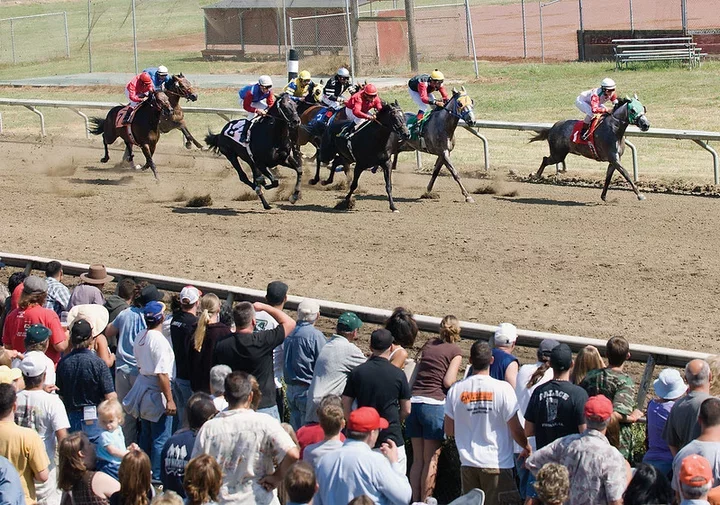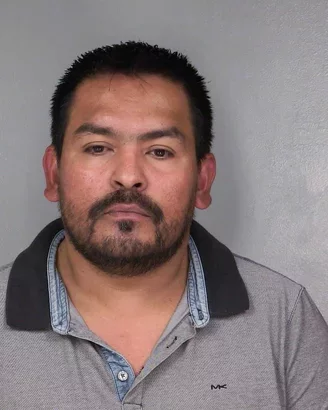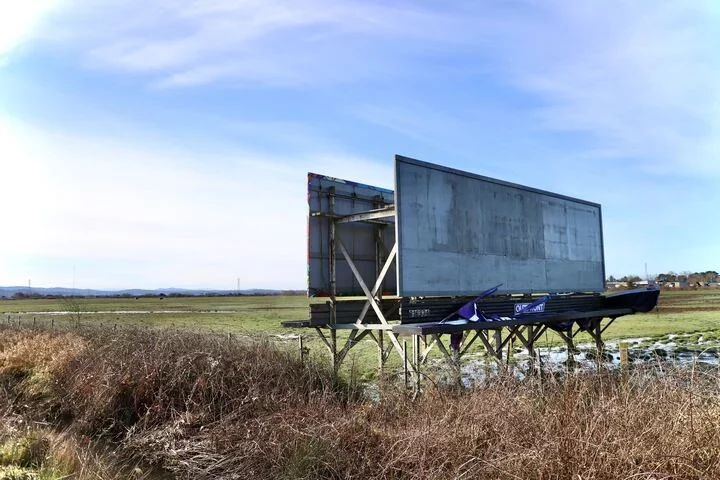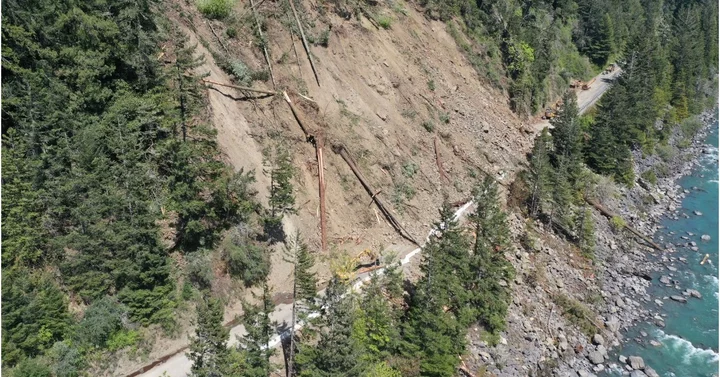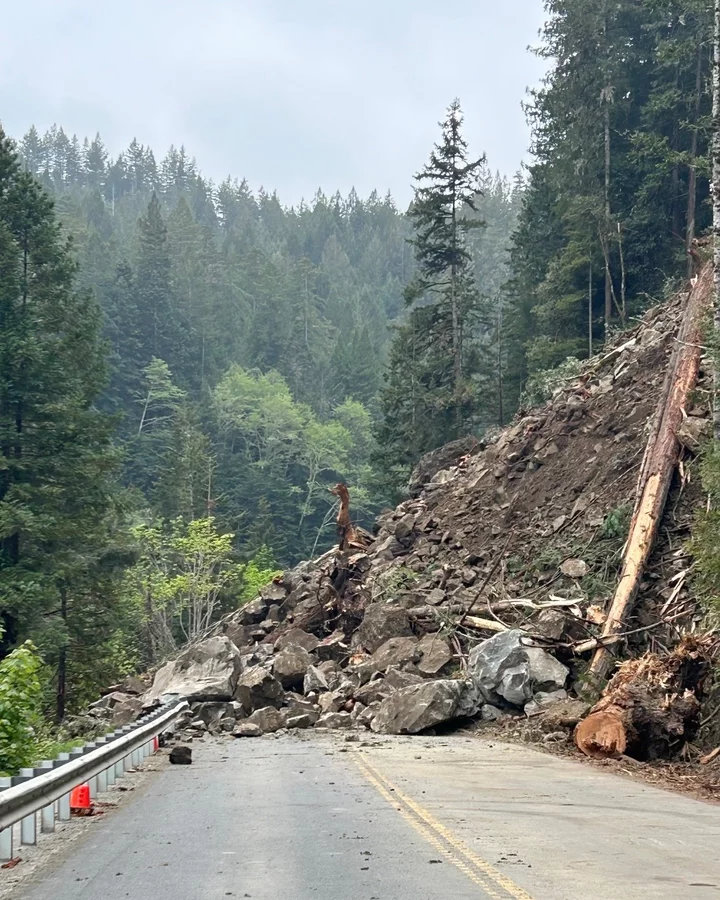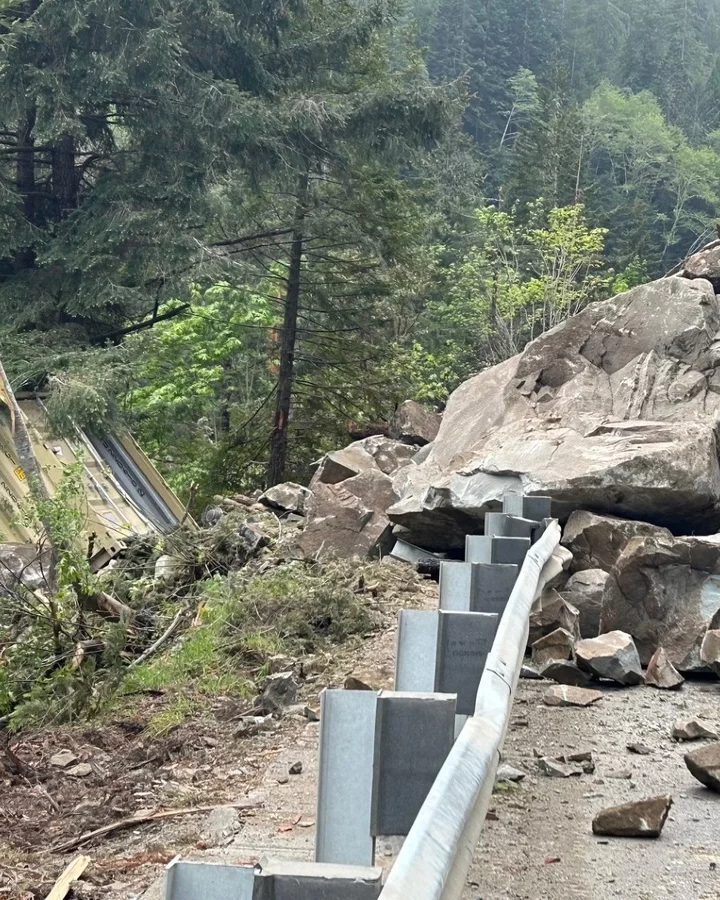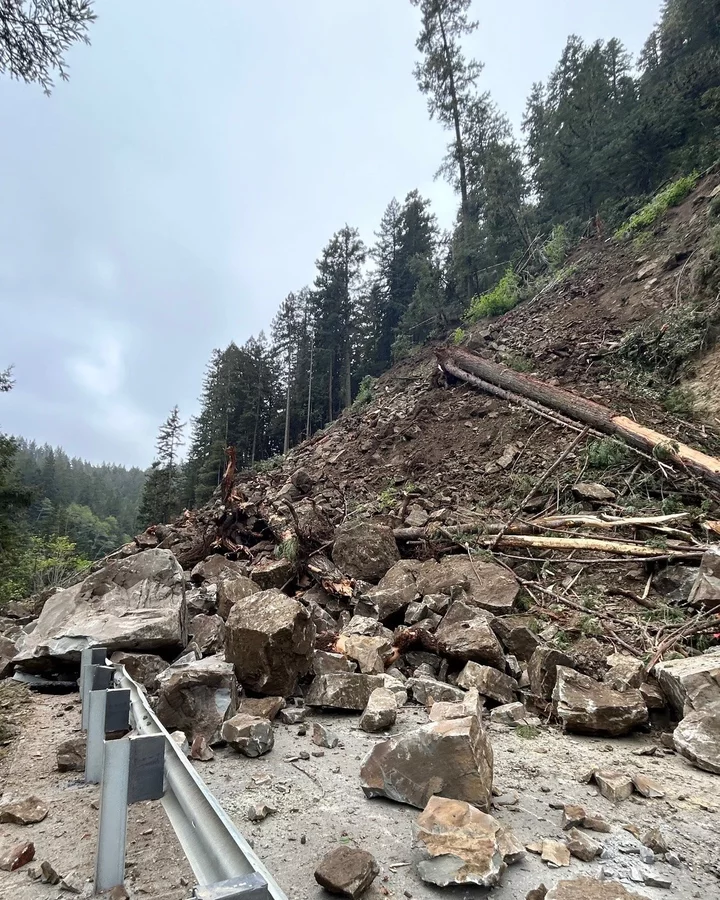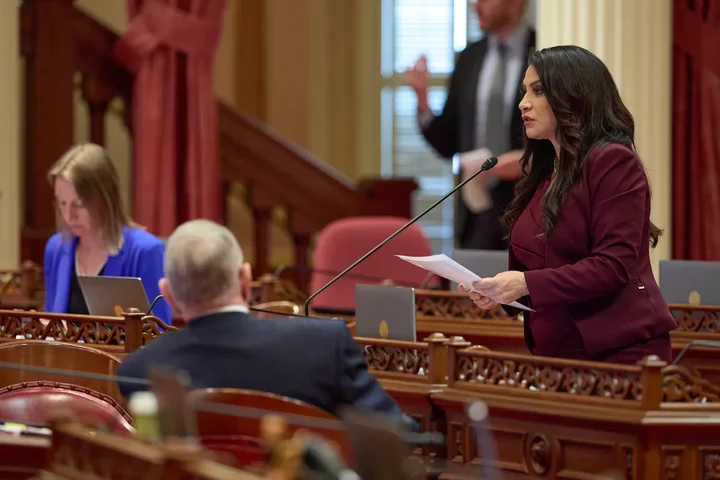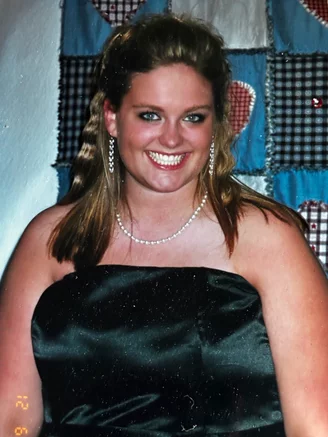THE FINAL STRETCH: Humboldt County Fair Urges Community to Stand Up and Make Noise in Support of Horse Racing
LoCO Staff / Wednesday, April 23, 2025 @ 5:57 p.m. / Our Culture
Horse racing at the Humboldt County Fair. Photo: Redwood Coast, via Flickr. Creative Commons license.
###
PREVIOUSLY:
###
Press release from the Humboldt County Fair:
The Humboldt County Fair Horse Racing Committee is calling on all community members, horse racing enthusiasts, and supporters of local tradition from Humboldt County and beyond to speak up in support of horse racing in Northern California – especially here in Ferndale, where it has been a cherished tradition for generations.
Horse racing at the Humboldt County Fair is not just a sport – it is a historic and cultural pillar that contributes to our local economy, supports jobs, and brings our community together in a truly unique way. This treasured tradition has deep roots, with a legacy that spans more than a century, making it one of California’s most enduring county fair race meets.
However, the future of live horse racing in Humboldt County and across Northern California is at a crossroads. Decisions being made at the state level in the coming month could dramatically impact the survival of our race meet. That’s why we are urging our neighbors, community leaders, and supporters from all corners of the state to take immediate action.
We are asking you to reach out to your local County Supervisors, State Senators, Assembly Members, Members of Congress, and the Governor’s Office. Tell them you support horse racing in Humboldt County. Let them know that this sport is more than just a pastime – it is a vital part of rural California’s identity and economy.
Here’s how you can help. Contact your elected officials – Call, email, or send letters to your local and state representatives expressing your support for horse racing in Humboldt County.
Senator Mike McGuire - senator.mcguire@senate.ca.gov - 1021 O St., Suite 8518, Sacramento, CA 95814, Phone (916) 651-4002, or 1036 5th St., Suite D, Eureka, CA 95501, Phone (707) 445-6508
Governor Gavin Newsom - gavin.newsom@gov.ca.gov - 1303 10th Street, Suite 1173, Sacramento, CA 95814, Phone (916) 445-2841
Representative Jared Huffman - https://huffman.house.gov/contact/email-me 317 Third Street Suite 1, Eureka, CA 95501, Phone (707) 407- 3585
Humboldt County District 1 Supervisor Rex Bohn - rbohn@co.humboldt.ca.us 825 5th Street, Eureka, CA 95501, Phone (707) 476-2391
Humboldt County District 2 Supervisor Michelle Bushnell - mbushnell@co.humboldt.ca.us 825 5th Street, Eureka, CA 95501, Phone (707) 476-2392
California Horse Racing Board (CHRB) - information@chrb.ca.gov, 1010 Hurley Way, Suite 300, Sacramento, CA 95825, Phone (916) 263-6000
With your support, we can protect this time-honored tradition and ensure that the Humboldt County Fairgrounds continues to host thrilling, community-centered racing for years to come.
Let’s keep the spirit of the Humboldt County Fair alive – vibrant, proud, and racing strong.
For more information, updates, or ways to get involved, please contact the Humboldt County Fair Horse Racing Committee.
Greg Gomes,
Chair, Horse Racing Committee,
Vice President, Humboldt County Fair Association,
707-499-8859
greg@pacificpaperco.com
BOOKED
Today: 2 felonies, 10 misdemeanors, 0 infractions
JUDGED
Humboldt County Superior Court Calendar: Today
CHP REPORTS
No current incidents
ELSEWHERE
RHBB: Pedestrian Killed in Collision on Broadway in Eureka
RHBB: Bicyclist Injured in Collision with SUV Near Orick
RHBB: Trailer Fire Reported Near Golden Bear Bridge in Klamath
County of Humboldt Meetings: Fish & Game Advisory Commission Agenda - Regular Meeting
Following Jury Conviction on Rape and Sexual Assault Charges, Valentin Vargas-Diaz Sentenced to Six Years in Prison
LoCO Staff / Wednesday, April 23, 2025 @ 3:41 p.m. / Courts
###
Press release from the Humboldt County District Attorney’s Office:
[On April 21], the Honorable Judge Kaleb V. Cockrum sentenced 45-year-old Valentin Vargas-Diaz, to serve 6 years in prison, the maximum under the law, for his March 2021 rape of a 29-year-old woman. The sentence follows his conviction by a Humboldt County jury earlier this month for two crimes: Rape of an Intoxicated Person, in violation of Penal Code section 261(a)(3), and Sexual Penetration by Foreign Object of an Intoxicated Person, in violation of Penal Code section 289(d).
On March 24, 2021, 29-year-old Jane Doe consumed alcoholic beverages while at the Myers Flat Saloon, an establishment which Vargas-Diaz regularly patronized. The next morning, Doe, who was unable to remember events from the remainder of the night, awoke unclothed in Vargas-Diaz’s bed, causing her distress and confusion.
Shortly after leaving Vargas-Diaz’s residence, Doe sought help by going to the hospital. Sexual Assault Nurse Examiner Hannah Wright conducted a forensic examination of Doe. Despite some apprehension, Doe reported to Humboldt County Sheriff’s Deputy Colton Ross what she knew about the events of March 24.
During his investigation, Deputy Ross spoke with Vargas-Diaz, who claimed Doe was extremely intoxicated the night of March 24, so he gave her a ride to her home and assisted her through her gate before he left. Vargas-Diaz denied sexual intercourse occurred. However, DNA evidence recovered during the sexual assault forensic exam by Nurse Wright revealed otherwise. Additionally, toxicology results further confirmed Doe was highly intoxicated when Vargas-Diaz sexually assaulted her.
Senior Deputy District Attorney Whitney Timm prosecuted the case with assistance from DA Investigator Tim Marsolan and DA Victim Witness Advocate Caitlyn LaHaie.
District Attorney Stacey Eads stated: “I commend Doe for her bravery and perseverance in holding her offender accountable for his crimes. We at the District Attorney’s Office are committed to seeking justice for survivors of sexual assault.”
Supervisors Approve Letter of Opposition to Bill That Would Redefine ‘Customary Maintenance’ on Billboards
Ryan Burns / Wednesday, April 23, 2025 @ 2:13 p.m. / Government , Sacramento
Several Humboldt County billboards stand in wetlands or estuaries, Humboldt County Supervisor Mike Wilson noted at a meeting on Tuesday. | File photo of Arcata billboards by Andrew Goff.
###
The Humboldt County Board of Supervisors on Tuesday approved a letter of “strong opposition” to a new state bill that would would dramatically expand the definition of “customary maintenance” on billboards, allowing sign companies to make substantial changes to those structures without local government review or permitting.
“No other structure of this size in the state of California gets that kind of waiver,” Third District Supervisor Mike Wilson said during Tuesday’s meeting.
The letter, which the board approved with a 4-1 vote, argues that Assembly Bill 770 would undermine local authority, compromise public safety and endanger environmental and cultural resources. It was placed on the agenda’s consent calendar, meaning it was scheduled to be adopted among a batch of items without specific deliberations, but First District Supervisor Rex Bohn pulled it for discussion.
“I just couldn’t sign the letter the way it was,” Bohn said, noting that it’s twice as long as the bill itself and that it mentions “cultural resources,” which he considered a stretch since most billboards are located next to four-lane highways. Bohn argued that while many people “hate billboards,” others appreciate the tax base they generate. He said repair technology has improved, and sign owners should be allowed to take advantage of that.
“They’re basically earthquake-proofing [the billboards], kind of like what we make people do with old buildings, just making them stronger or better,” Bohn said.
Wilson disagreed. He said the language of the bill would apparently allow owners to replace nearly the entire structure, so long as the face of the sign remained the same, without a permit. That could mean replacing wooden posts and support beams with metal ones, or even installing or replacing concrete foundations.
“This could be in areas of environmental concern in ecologically sensitive areas,” Wilson said. “We have billboards currently in Humboldt County in wetlands and estuaries. So there would be no permit required for all the large equipment to put that in. There would be no permit required for historical or archaeological review. I’m sure tribal entities would not like that very much.”
Wilson also mentioned the increased public safety risk posed by reinforced metal structures along the roadside.
“Sometimes the billboards are actually, in many cases, encroaching on public lands or on properties where the owners don’t even know that they’re there,” Wilson added. “We’ve seen that all over the place. We’ve seen it in Humboldt Bay. We see it in Del Norte County. … It’s just odd that we would support this unsafe and environmentally significant change in the code.”
Fourth District Supervisor Natalie Arroyo agreed, and she pushed back on Bohn’s skepticism about cultural resources. Many of Humboldt County’s roadways were built on or near tribal pathways and village sites, she said, adding that protecting such archaeological resources “is a bit of a moral imperative for those of us in elected office.”
Second District Supervisor and Board Chair Michelle Bushnell said her understanding was that existing billboards already went through the necessary permitting processes, but Planning and Building Director John Ford said that’s not necessarily true.
“A lot of the billboards that exist out there were never permitted,” he said, and he vouched for Wilson’s assertion that the bill would essentially allow billboards to be completely rebuilt without local review.
Bohn remained unconvinced. Regarding the letter’s expression of concern over the environmental impacts of “heavy machinery,” he said, “Last night I counted seven pieces of equipment exceeding 50,000 pounds building a trail next to the wetlands and cultural resources” referring to the Humboldt Bay Trail project.
Wilson countered by pointing out that “all the laws that protected the ecological and cultural values” for that project could be sidestepped by billboard owners should AB 770 pass.
“[T]his is a use that is not in the public trust’s best interest,” Wilson said. “This is just — this is for private commercial use.”
Wilson also said the bill could nullify the legal precedent that was established after Viacom Outdoor, Inc. sued the City of Arcata in 2006 after city officials red-tagged billboards that had been toppled by storms, thereby preventing them from being re-erected.
The advertising company sued, arguing that the city’s regulatory authority over such repair work was preempted by California’s Outdoor Advertising Act. A trial court agreed, but the decision was overturned on appeal. Local jurisdictions can, in fact, regulate the rebuilding of storm-damaged billboards, the appellate court decided.
Wilson said AB 770 would effectively invalidate that precedent.
“We don’t do this for houses; we don’t do this for schools; we don’t do this for — there’s just no structure we do this for,” he said. “Why would we do it for this? It seems extreme and I hope that we oppose it today.”
Bohn circled back to Wilson’s remark about private commercial use. “Private use is not a bad thing,” he said. “Private use is what drives this county.” As for the claim that this bill would impact people’s quality of life, Bohn didn’t buy it.
“I had two friends die this weekend,” he said. “I’m thinking about their quality of life and I don’t think the billboards had a damn thing to do with it.”
Arroyo eventually made a motion to approve the letter, and Wilson seconded it. Right before the vote, Bushnell said she was conflicted but concerned about the potential loss of local control. She wound up joining the majority vote on the motion, which passed 4-1, with Bohn dissenting.
The authors of AB 770 are Assemblymembers Mark González and Blanca Pacheco, both Democrats from the Los Angeles area. The legislation is supported by the California State Outdoor Advertising Association, a lobbying organization dedicated to advancing the outdoor advertising industry in the state.
The Outpost emailed representatives for both of the bill’s authors to ask about their reasoning behind the bill and get their response to the letter of opposition approved by the Humboldt County Board of Supervisors. We didn’t hear back from González’s office before this post was published. A spokesperson for Pacheco said the Assemblymember has been in back-to-back meetings and her office would be unable to gather the necessary information in time for our deadline.
We also emailed the office of our own representative in the Assembly, Chris Rogers. His chief of staff, Meredith McNamee, said the bill remains in committee hearings and Rogers has not yet had a chance to review it. Bills often get substantially amended in committee, so if this one emerges it will likely be different. Rogers and his staff will review the bill prior to it going to a vote on the floor, if it makes it that far, McNamee said.
You can read the letter approved by the supes via the link below.
###
(PHOTOS) Aerial Views of the Highway 36 Landslide
Andrew Goff / Wednesday, April 23, 2025 @ 10:52 a.m. / Traffic
PREVIOUSLY:
# # #
Highway 36 remains closed near Swimmer’s Delight, with Caltrans still saying it will be “days” until the roadway is ready for traffic again.
Why so long, you wonder? Caltrans has posted a few aerial shots of the problem area and, yeah, we get it. See below.
Lawmaker Seeks New Way to Outlaw Threats Against California Schools and Places of Worship
Denise Amos / Wednesday, April 23, 2025 @ 7:40 a.m. / Sacramento
State Sen. Susan Rubio addresses lawmakers at the state Capitol on May 16, 2024. Photo by Fred Greaves for CalMatters
###
This story was originally published by CalMatters. Sign up for their newsletters.
###
An Inland Empire legislator wants to make it easier to penalize people who make threats affecting schools or places of worship.
The proposal by state Sen. Susan Rubio, a Democrat from West Covina, has stirred up broad opposition as well as support from dozens of organizations. It pits police, prosecutors and school employee groups against youth and disability advocates and the ACLU.
Existing law already says it is a crime to make a threat about something that could result in death or great bodily injury to someone. If the threat is “unequivocal, unconditional, immediate, and specific” and causes “sustained fear” in a person, the crime is a misdemeanor or a felony.
Rubio, a former public school teacher at Baldwin Park and Monrovia school districts, said she championed this bill to highlight the location of the threat, rather than the victim of the threat. She said that phoned-in or texted threats often waste time and money for schools and first responders and traumatize people.
“I’ve seen the toll these threats take on students and communities,” she said in a statement. “Even when the danger isn’t real, the fear is, and the trauma stays with kids long after the lockdown ends.”
But there’s disagreement about whether a new law is needed. Opponents point out that this bill is similar to existing law.
Rubio said existing law has too many loopholes, but this bill would give authorities more options.
“California law shouldn’t allow someone to threaten a mass shooting at a school and walk away without consequences, simply because no individual person was named in the threat,” she said.
Groups representing children pointed out that young people often make threats they don’t mean and don’t consider the legal consequences. A new law, they fear, will make schools even more of a conduit to incarceration for some students.
“It allows police intervention for what’s perceived as a threat, even if it’s just a joke, a mental breakdown, or expressing yourself through art,” said Kevin Maturano, a policy fellow with Fresh Lines for Youth.
“And like every punitive policy, it will target Black and Brown students the most. But beyond the harm for youth, this bill will also waste millions of taxpayer dollars.”
Rubio said her proposed bill specifies that perpetrators who are under 18 would be charged with misdemeanors, not felonies, “to strike a balance between accountability and keeping young people on a path toward growth, not incarceration.”
The bill passed the Public Safety Committee 6-0 in March. On April 7 it was placed on the Appropriations Committee’s suspense file, where most bills that cost extra money go. Legislators are expected to consider it next month.
This is at least the eighth time such a measure has come before the Assembly since 2015. Two similar bills passed in 2015 but were vetoed, and others failed in committee, including during last year’s legislative session.
This time 32 entities registered support for it, including associations representing police officers, sheriff’s deputies, school resource officers and prosecutors, as well as the League of California Cities, the Hindu America Foundation, Rio Hindo College and San Diegans for Gun Violence Prevention.
Against it were 16 organizations, including ACLU California Action, the Alliance for Boys and Men of Color, the California Public Defenders Association, the Children’s Defense Fund California, and Disability Rights California.
Abundance Meets Resistance: Are Democrats Finally Ready to Go All in on Building Housing?
Jeanne Kuang / Wednesday, April 23, 2025 @ 7:37 a.m. / Sacramento
This story was originally published by CalMatters. Sign up for their newsletters.
###
Amid a post-2024 wave of Democratic interest in the burgeoning pro-development “abundance” movement, this seemed to be an easy year for California’s yes-in-my-backyard housing development activists.
Democratic leaders in the state Legislature declared their intention to tackle affordability this year. Gov. Gavin Newsom and other politicians have since embraced the “abundance” platform, which argues that Democrats must do more to quickly deliver housing, transportation and other infrastructure projects to their constituents.
Lawmakers have introduced ambitious bills that would, for housing developments in existing neighborhoods, blow a hole through the longstanding thicket of environmental reviews and regulations that often slow down projects and add costs. One of those passed its first committee on Monday.
Still, YIMBY-ism hit a stumbling block Tuesday in the form of the Senate housing committee. The committee, led by Sen. Aisha Wahab, nearly killed a closely watched bill to require cities to allow taller, denser apartments and condo construction near public transit stations.
Wahab said she was acting on a chorus of familiar objections from progressives and others who have long delayed housing construction in California: The legislation didn’t guarantee that projects would be built with union labor. It didn’t require that the new units be affordable for low-income residents. It could infringe on local governments’ ability to block or green-light projects. It opened up the possibility of bypassing certain environmental reviews.
In the end, the committee voted 6-2 against Wahab’s objections to narrowly advance Senate Bill 79, by Sen. Scott Wiener, a San Francisco Democrat and prominent advocate for housing production. Some Democrats were absent or didn’t vote. The committee also killed a different Wiener bill that would have further loosened restrictions on property owners who want to split single-family homes into duplexes. It was a stark reversal from prior years in the Legislature, when Wiener chaired the housing committee and pushed through several bills to spur housing production.
The tense hearing on Tuesday exposed pro-development advocates’ mounting frustrations with Wahab. It also revealed remaining hurdles for “abundance”-minded Democrats in a progressive Legislature where lawmakers who say they want to increase housing construction are nevertheless prone to tacking on price controls, labor agreements and other regulations to appease various constituencies.
That lawmakers voted to advance the bill despite Wahab’s opposition indicates some are ready to override progressive concerns on housing developments. But critics predict debates like these will ultimately sink Democratic leaders’ goals of refocusing the party platform on making California affordable.
“They’re going to blow it,” said Senate Minority Leader Brian Jones, a San Diego Republican, of the Democrats’ affordability agenda earlier this month. “They still believe in government control. They’ll release this regulation, but not this other one. They’re not willing to deregulate enough.”
Senate Pro Tem Mike McGuire, who appointed Wahab as committee chair, did not respond to inquiries about how Wahab’s stances and the debate over what limits to place on development affects his affordability agenda. He instead issued a statement saying that finding “innovative solutions” to the housing crisis “is at the top of the Senate’s agenda.”
“While it’s still early in the legislative session and in the committee hearing process, there are dozens of housing bills that legislators are having meaningful and honest conversation and debate on,” he said. “I trust we’ll have significant housing legislation advance this year.”
Wiener would not say whether he has asked McGuire to step in, but said he was confident a growing number of lawmakers agree with his approach to make it easier to build.
YIMBYs fight more cautious approach
Pro-development activists have clashed with Wahab since last month, when, during her first hearing as chair of the housing committee, she questioned the effectiveness of policies that have loosened restrictions on the dense, urban, sometimes parking-less projects that are central to the YIMBY platform of bringing down rents by increasing the supply of market-rate housing.

State Sen. Aisha Wahab, a Hayward Democrat, votes during the Senate Appropriations Committee hearing on suspense file day at the state Capitol in Sacramento on Sept. 1, 2023. Photo by Rahul Lal for CalMatters
A progressive who is focused on preserving explicitly affordable units for low-income tenants, Wahab, a Hayward Democrat, was pushing for legislation to help cities that enact rent caps compete with other municipalities for state housing and planning grants. Some studies have found rent control in San Francisco has reduced rental supply, while other economists say capping rents is still needed to help those who are housing insecure.
“The state has prioritized development, development, development,” Wahab said. “The types of development that are going up with zero parking and all these giveaways to developers have also not translated to housing that has dignity that people want to stay in and raise their families in.”
Her bill drew skepticism from some colleagues on the committee, who noted the state funding programs are for development and production, but nevertheless voted to advance it.
The chair continued to frustrate pro-development activists with her opposition to Wiener’s housing-near-transit bill.
It is a narrower revival of a proposal Wiener tried before. In 2018, he introduced legislation to allow taller, denser buildings around major transit stops, overriding local zoning rules and the objections of local governments. It died in committee. In 2020, he took another crack at the issue. That bill was silently axed by the Senate’s appropriations chair.
In unusually frank comments as he presented the bill on Tuesday, Wiener said Wahab had not offered any amendments to the legislation — only blanket opposition — and criticized the analysis prepared by the committee’s staff, who work under Wahab’s leadership.
“Reading the committee analysis is just an avalanche, laundry-list of 10,000 things that are supposedly wrong with the bill,” he said. “Reading the analysis, there’s apparently not a single thing in the bill you like.”
Wahab, in turn, said the lack of explicit affordability requirements for units built near transit made the proposal a “non-starter for me at the very beginning.”
“I do believe in building more,” she said. “We must build housing for all income levels, and I have been consistent in that position.”
Chairs tend to get their way in the Capitol, but on rare occasions a committee votes to override their concerns, a tactic Wiener has used before.
In 2023, he was pushing what was then among the most controversial pro-housing development bills through the Legislature. When Arleta Democrat Luz Rivas, then the chairperson of the Assembly Natural Resources Committee, attempted to kill it, a bipartisan gaggle of Republicans and pro-development Democrats pushed it through anyway.
###
CalMatters’ Ben Christopher contributed to this story.
OBITUARY: Emily Lane Smith, 1988-2025
LoCO Staff / Wednesday, April 23, 2025 @ 6:56 a.m. / Obits
Emily Lane Smith, 36, passed away on Saturday, April 12, 2025 in Loleta. She was born in Eureka at General Hospital on November 22, 1988.
Emily attended elementary school in Hoopa and Rio Dell before being promoted to Fortuna Union High School, where she graduated in 2006.
Emily was a good student and learning seemed to come easy for her. She made friends easily and several have expressed how she was their “ride or die.” She had a beautiful smile that lit up a room. Emily enjoyed reading, road trips, days at the river or beach, watching movies and being with family and friends.
When Emily was 16, her older brother Paul passed away. This loss was something Emily could not overcome and the rest of her life she struggled with addiction.
Emily is survived by her son, Noah, mother Rebecca Kinderknecht (Loren), her father Cody Smith (Rochelle), siblings, Aaron(Derek), Jordan (Sierra), Cameron(Justine), Rowdy, Alexis, and Jade, her grandparents, Darrel and Connie Ridenour, Ginger Speer (Bob) and stepmother Carmen Sargent. She also has numerous aunts uncles and cousins that will miss her dearly.
Emily was proceeded in death by her brother, Paul Kinderknecht.
Memorial contributions can be made to your charity of choice. The family would like to extend their gratitude to everyone who has reached out and shared their memories of Emily.
A celebration of life is being planned for May 10 at the Rio Dell Fireman’s Hall at 12 noon.
###
The obituary above was submitted on behalf of Emily Smith’s loved ones. The Lost Coast Outpost runs obituaries of Humboldt County residents at no charge. See guidelines here. Email news@lostcoastoutpost.com.

